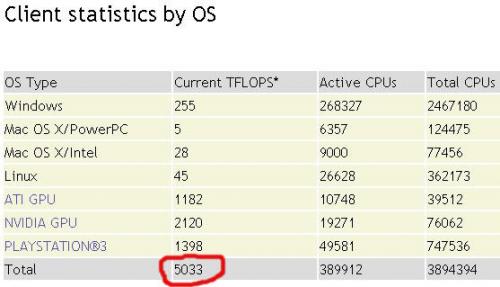7 replies to this topic
#1
Live Forever
-

-
Guest
Recorder
-
7,475 posts
-
9 ₮
Posted 20 December 2008 - 07:12 AM
It is likely that the Folding@Home project will cross the 5 petaFLOPS barrier at some point in early 2009.
It is currently hovering around 4.6 petaFLOPS, but I have been keeping an eye on it, and it has been slowly creeping up for the past couple months.
http://fah-web.stanf...y?qtype=osstatsAccording to wikipedia, these are when the different petaFLOPS barriers have been crossed:
1 September 16, 2007
2 early May 2008
3 August 20, 2008
4 September 28, 2008
3 to 4 went pretty quick (likely because GPU additions were coming in fast at that point), but it has been inching for awhile after that.
I know it doesn't have to do with our team specifically, but I was just thinking about it.
#2
brokenportal
-

-
Life Member, Moderator
-
7,046 posts
-
589 ₮
-
Location:Stevens Point, WI
Posted 20 December 2008 - 08:40 AM
Damn it seems like we just crossed one and that that was huge. The singularity is going to have happened and be 5 years in the past in no time. We're going to be wearing t shirts that have tvs on them and eating a full course meal in a pill while beaming around to different planets hanging out with aliens like it aint no thing in no time now.
#3
Mind
-

-
Life Member, Director, Moderator, Treasurer
-
19,769 posts
-
2,000 ₮
Posted 21 December 2008 - 09:38 PM
The singularity is going to have happened and be 5 years in the past in no time. We're going to be wearing t shirts that have tvs on them and eating a full course meal in a pill while beaming around to different planets hanging out with aliens like it aint no thing in no time now.
We can always hope and dream! More likely, as folding@home grows to several dozen petaflops over the next couple of years, it will increasingly become an essential research tool to combat aging.
If we can grow the F@H prize for a second year of competition you had better believe we will be doing our part.
#4
Live Forever
- Topic Starter
-

-
Guest
Recorder
-
7,475 posts
-
9 ₮
Posted 12 February 2009 - 03:04 AM
As of right now (the moment of writing this) it is operating at 4.9 petaFLOPS, so it is getting close.
http://fah-web.stanf...y?qtype=osstats
#5
dnamechanic
-

-
Life Member
-
1,518 posts
-
0 ₮
Posted 18 February 2009 - 03:56 PM
...so it is getting close.

Image derived from Stanford Clent Stats.
#6
maestro949
-

-
Guest
-
2,350 posts
-
4 ₮
-
Location:Rhode Island, USA
Posted 18 February 2009 - 04:41 PM
...so it is getting close.

Image derived from Stanford Client Stats.
Cheers!
#7
Live Forever
- Topic Starter
-

-
Guest
Recorder
-
7,475 posts
-
9 ₮
Posted 19 February 2009 - 06:51 AM
...so it is getting close.

Image derived from Stanford Clent Stats.
Sweet! Yet another major milestone for the great project.
#8
Live Forever
- Topic Starter
-

-
Guest
Recorder
-
7,475 posts
-
9 ₮
Posted 19 February 2009 - 06:59 AM
The Folding@home blog post on the milestone:
http://folding.typep...aflop-mark.htmlBased on our FLOP estimate (see http://fah-web.stanf...?qtype=osstats), Folding@home has passed the 5 petaflop mark recently. To put it in context, traditional supercomputers have just broken the 1 petaflop mark, and even that level of performance is very challenging to aggregate. The use of GPU's and Cell processors is has been key to this, and in fact the NVIDIA numbers alone have just passed 2 petaflops.
Thanks to all who have contributed and we look forward to the next major milestones to be crossed!
Approximately 5 times more powerful than the most powerful traditional supercomputer; Amazing.
1 user(s) are reading this topic
0 members, 1 guests, 0 anonymous users
Reply to quoted posts Clear













































